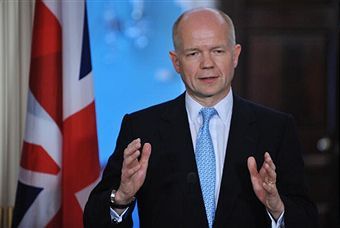 Point six of ten on the Conservative-Liberal agreement reads as follows: “We will
work to promote stability in the Western Balkans.” William Hague will get a chance to show what this means when he joins fellow European foreign ministers at a summit in Sarajevo on 2 June.
Point six of ten on the Conservative-Liberal agreement reads as follows: “We will
work to promote stability in the Western Balkans.” William Hague will get a chance to show what this means when he joins fellow European foreign ministers at a summit in Sarajevo on 2 June.
As I argue in a new brief about Balkan policy, the meeting could not come at a better time. The region is beginning to look dicey
once again. Though Balkan countries were asked by the West to proceed along the reform-laden route towards EU accession, which entails reforming their economies, making friends with erstwhile
enemies and adjusting their constitutions, there is now uncertainty whether the EU actually wants them to join the club. Unsurprisingly, Balkan leaders are becoming less inclined to introduce
difficult reforms.
It is hard not to blame EU leaders. Many Balkan countries remain weak, have unresolved internal and external disputes and are making slow progress on meeting the conditions of EU membership.
Premature Balkan accession may wreck the Union, say many in Berlin and Paris.
On the other hand, postponing accession risks damaging hard-won progress on regional peace and stability. If the Bosnian Serbs, Croats and Muslims have no common EU destiny, then many fear they will have no incentive to cooperate.
So, is there a way to manage both sets of risks? Yes, because the choice between a “go-fast” and a “go-slow” approach to the region’s EU integration is actually false. Since 2004, the EU accession process has become ever more demanding, and the fast-track to accession closed long ago. There are now tougher requirements for opening and closing negotiations. No area of negotiation – from an applicant country’s environmental standards to competition laws – is ever more than provisionally finished, with the European Commission now demanding concrete implementation of laws, rather than just promises. People have learnt from the Bulgarian and Romanian experience.
EU members have at least 75 veto-points where they have to agree unanimously for an applicant country to advance. Even Croatia, if it accedes as expected around 2013, will have taken ten
years from its date of application and eight years from the start of accession talks. The other Western Balkans states, which lag well behind Croatia, cannot hope to start talks before 2012. So
their best-case accession date already lies beyond 2020.
In other words, it is not a question of fast-tracking EU membership for the Balkan countries, but ensuring that the EU remains engaged and encouraging the Balkan region’s reform-minded
politicians. To ensure this, the Foreign Secretary should push his European colleagues to re-adjust the EU’s accession process. The EU should assess how compatible Balkan countries’
laws are with European laws ASAP. If possible, it should begin doing this for as many Balkan countries as possible, whilst at the same time creating intra-regional competition. The aim should be
that by the end of 2011, under Poland’s first EU Presidency, all the countries will have completed this process and achieved candidate status.






Comments